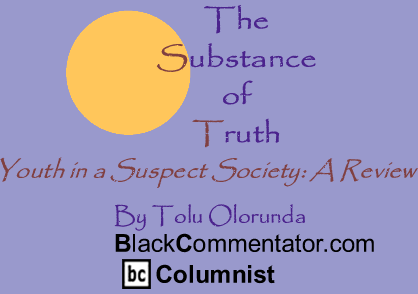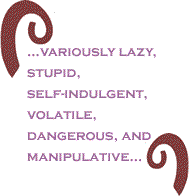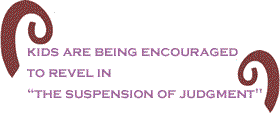
|
||||||||||||||||||||||

|
|

Custom Search
|
|
 |
|
It
need not be said, though I find it necessary to restate, that
Henry Giroux is one of the most important public servants the
last 100 years have produced. But perhaps what most makes this former high school basketball star distinct is his tireless advocacy on behalf of the frail, the vulnerable, the disposable. Henry has focused much of his writing over the fragile existence disenfranchised populations are largely relegated to. Giroux’s “critical sympathy” to the often forgotten, as Georgetown professor Michael Eric Dyson once mentioned, is what pushes him time after time to engage issues many of his peers would rather stay far away from - for fear of sanction, resentment, or job loss. In that spirit of deep moral determination and fervent conviction, comes his latest work: Youth in a Suspect Society, which, above all else, is an attempt to interrogate the increasingly hostile future our society is preparing, with no sense of shame or irony, for its next tenants - young people. Giroux wastes no time condemning the “assault against youth” being waged by all those blind to the radical realities of reproof youth, and especially those of color, are being confined to by way of policy and legislation. An example of this is provided in the case of Deamonte Driver, a seventh grader from Prince George’s County, Maryland, who “died because his mother did not have the health insurance to cover an $80 tooth extraction.” Under the Lyndon Baines Johnson administration, Giroux writes, there was at least a “willingness to fight for the rights of children, enact reforms that invested in their future, and provide the educational conditions necessary for them to be critical citizens.” But all advancements made in that era were rolled over as one neo-conservative administration after the other found its way into the White House. And the most devastating of them, in theory and practice, Giroux insists, was the 43rd one. But government alone isn’t responsible, he notes, because anti-Youth legislations couldn’t be established as law without a media complex that has “habitually” reinforced representations, however false, of young people as “variously lazy, stupid, self-indulgent, volatile, dangerous, and manipulative.” It’s important to note that these suggestions “do more than degrade young people and resonate with their underlying marginality and disposability”; they also “legitimate the passage of draconian measures, policies, and laws at the highest levels of government.” So, it then makes sense when schools become transformed into secondary stations for police officers, military personnel, and other agents of the State. The message: Kids and, especially, Youth are a threat to society - a threat which must be watched with close scrutiny, dealt with diabolically, and, when necessary, punished with the power of the law.
In Youth in a Suspect Society, Giroux also takes special time out to dive deeper into the challenges confronting children, as they try to navigate a world where giant corporations see them as nothing but disposable commodities - to be bought and sold. Children, Dr. Giroux writes, “constitute the primary index through which a society registers its own meaning, vision, and politics.” And today’s children are having to become more accustomed to a speed-driven society; a society that treasures punctuality over poignancy, and impatience over incandescence. Thus, kids are being encouraged to revel in “the suspension of judgment, the inability to think critically, [and] the avoidance of responsibility.” (Never mind that these very kids are still ultimately barraged with blame for low test scores or poor performance on state standardized tests.) Kids would also have to get used to “a society that measures its success and failure solely through the economic lens of the Gross National Product (GNP)”; a society unable to “define youth outside of market principles determined largely by … market growth and the accumulation of capital.” This society, children should be aware, sees them not only as an “expansive and profitable market but as the primary source of redemption for the future of capitalism.” Examples of such thinking abound in Youth in a Suspect Society. Giroux’s meticulous research unearths numerous reports of kids being selected by toy companies to act as representatives (unpaid employees), such as a GIA-sponsored event, “Slumber Party in a Box,” which enlists “agents” to “invite their friends to an overnight party, hand out free products to them, and then provide ‘feedback through quizzes’ to GIA headquarters.” Corporations have found kids and pre-teens great resources - peer pressure power - to use in expanding their brand - even if it commodifies the non-market value of friendship. Giroux also turns a sharp gaze on pro athletes like Michael Jordan and Tiger Woods, who, he says, appear more interested in inflating their bank account figures than “using their celebrity status for educating young people about character, hard work, the value of sportsmanship, and the sheer joy of athleticism.” But there’s another angle to this, which hasn’t gotten as much press among progressive circles. As Giroux writes:
The war on terror and drugs, Giroux asserts, has added a new target: Youth. This war, unlike the more glamorous cross-national disputes, doesn’t necessarily involve two sides in contentious combat. This war is characterized by “4th grade reading scores and graduation rates [being] used to determine how many prison cells will be built.” This war is against the growing population of “pint-size nihilists” amongst us. Extinguish them! And so, Instead of being viewed as impoverished, minority youth are seen as lazy and shiftless; instead of being recognized as badly served by failing schools, they are labeled uneducable and pushed out of schools; instead of being provided with decent work skills and jobs, they are either sent to prison or conscripted to fight in wars abroad; instead of being given decent health care and a place to live, they are placed in foster care or pushed into the swelling ranks of the homeless. These
enemies of our peace are then rightfully placed in schools
where the squeaking sound of metal detectors is omnipresent, where
police forces are dominant, where arrests, suspensions, and expulsions
are as commonplace as being frisked, cussed-out, or strip-searched
by security officers on your way to class. And while we’re at it, let’s make sure they’re excluded from “various forms of student aid,” post-conviction, including but not limited to “welfare payments, Medicaid, veterans’ benefits, food stamps, and… public housing.” Isn’t it so heartwarming to know that young people growing up have such a splendid future awaiting them? Giroux calls on “intellectuals” of great courage to “take a stand” against these “collective problems” putting at risk “not only young people and adults… but the very possibility of deepening and expanding democracy itself.” But how many of these intellectuals wouldn’t have to be summoned from the dead? As he rightly notes, the university has witnessed a radical shift in vision this past decade. Through hysteria whipped up by right-wingers following 9/11, many liberal or left-leaning professors have been silenced or fired to quell the paranoia expressed by some students that they’re being brainwashed. Their professors tried to force upon them “Marxist” and “Socialist” values - values that go by such scary prospects as critical thinking, intellectual freedom, and independent reasoning. These young people, Giroux writes, have been bamboozled by the likes of David Horowitz, president of the Center for the Study of popular culture, who’ve “hijacked political power and waged a focused campaign against the principles of academic freedom, sacrificing the quality of education made available to youth in the name of patriotic correctness.” Cheated out of an enlightening educational experience, Giroux contends, are young people, who, in exchange for being provided the tools to “critically engage what they know and to recognize the limits of their own knowledge,” are infantilized by appeasing academics. They are denied “opportunities to engage knowledge critically… [and] assume responsibility for what it means to know something.” Giroux’s hopes are for a “larger public dialogue about how to imagine a democratic future,” in the context of a Youth-centered pedagogy. Unfortunately, “We have entered a period in which the war against youth, especially poor youth of color, offers no apologies because it is too arrogant and ruthless to imagine any resistance.” Nonetheless, this ambassador of hope reassures: “… [P]ower as a form of domination is never absolute, and oppression always produces some form of resistance.” And though the laborious work of resistance must engage all sectors of society, Giroux’s call to young people is direct: “[G]o out into the world and actively try to change it.”
This faith, however, has been uprooted by years of indifference and antipathy, callousness and bellicosity. Children are now much too aware of the degree of disregard society disses them with. And they respond to it in ways that anger some and amuse others. But the concrete work of restoring this faith has hardly been addressed, let alone acted upon, before the publication of Youth in a Suspect Society. I recommend it with inestimable gratitude to Dr. Giroux for his moral vigor and matchless vitality. BlackCommentator.com Columnist, Tolu Olorunda, is a Nigerian native and cultural critic. Click here to reach Mr. Olorunda. |
|
 |
|
Any BlackCommentator.com article may be re-printed so long as it is re-printed in its entirety and full credit given to the author and www.BlackCommentator.com. If the re-print is on the Internet we additionally request a link back to the original piece on our Website. Your comments are always welcome. eMail re-print notice
If you send us an eMail message we may publish all or part of it, unless you tell us it is not for publication. You may also request that we withhold your name. Thank you very much for your readership. |
|
| |
|
| September10
, 2009 Issue 341 |
|
| Executive Editor: Bill Fletcher, Jr. |
| Managing Editor: Nancy Littlefield |
| Publisher: Peter Gamble |
| Est. April 5, 2002 |
Printer Friendly Version
in resizeable plain
text format or pdf
format. |
 |

|
| |
| |





























 Students
are, as a result, targeted and treated as potential criminals,
paving way for a society in which “children who commit a rule
violation as minor as a dress code infraction or slightly act
out in class can be handcuffed, booked, and put in a jail cell.”
Students
are, as a result, targeted and treated as potential criminals,
paving way for a society in which “children who commit a rule
violation as minor as a dress code infraction or slightly act
out in class can be handcuffed, booked, and put in a jail cell.”
 These
enemies of our peace might be too young to legally “marry,
drive a car, get a tattoo, or go to scary movies, but not too
young to be put in prisons for the rest of their lives.”
These
enemies of our peace might be too young to legally “marry,
drive a car, get a tattoo, or go to scary movies, but not too
young to be put in prisons for the rest of their lives.” Youth
in a Suspect Society
Youth
in a Suspect Society









